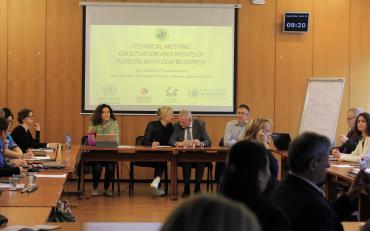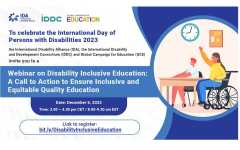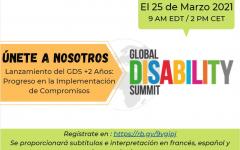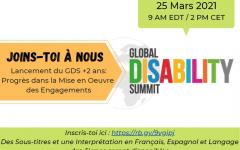Click here if you want to read the article in Spanish.
On 13 September 2017, Executive Board Members of the World Federation of the DeafBlind, as well as representatives from Sense International, the World Health Organisation (WHO), Office of the High Commissioner for Human Rights (OHCHR), and researchers from the London School of Hygiene & Tropical Diseases, and staff of the International Disability Alliance (IDA) Secretariat met for the first time in Geneva for a technical meeting to discuss the provisional structure of the Global Report that will be presented during the World Federation of the DeafBlind General Assembly in Benidorm, Spain 2018.
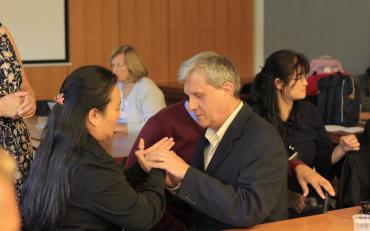
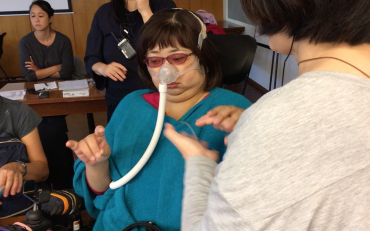
Representatives from the Asian, Latin American, European, and African offices of the World Federation of the Deafblind attended the event, which gave to participants the chance to address their main concerns and issues directly to the UN Agencies and others. The representatives provided information regarding the specific situations and violations that persons with deafblindness face in different countries, in order to find together how to better collaborate in the future to solve these issues.
The meeting was opened by the World Federation of the DeafBlind President, Mr. Geir Jensen and chaired by Alexandre Côte of the IDA Secretariat. During the meeting, existing tools for disability assessment and existing researches on deafblindness were presented and clarified in detail. Alarcos Cieza, Coordinator on Disability and Rehabilitation at WHO, made a presentation on the WHO classifications that are used by the health systems, in order to address issues and suggestions related to those tools both in the Global Report and in the reports on vision and hearing that the WHO is planning to products. Alarcos also invited the WFDB representative to work more closely with the WHO on these topics and on the reports.
Sense International Advocacy & Policy Manager, Bailey Grey, proposed policy solutions and interventions that were seen as useful for empowering persons with deafblindness, based on the experience of Sense International. Bailey also presented practical examples, such as Sense International’s work in Peru, where despite the existence of the legislation providing a right to a guide interpreter for accessing services, the guide interpreter does not exist as official profession. As such, Sense International is working with the Ministry of Education to deliver live and online courses.
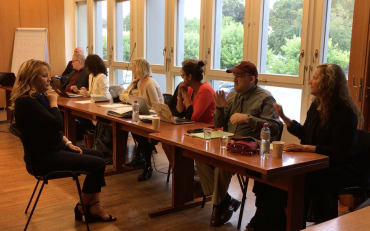
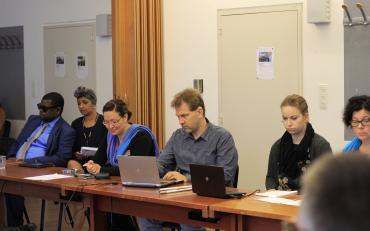
OHCHR Human Rights and Disability Advisor,Facundo Chavez Penillas, presented the human rights approach of the rights of persons with disabilities with particular focus to persons with deafblindness on different levels, in order to propose ways to improve their advocacy. Facundo also suggested to identify priorities regarding the actual situation of the rights of persons with deafblindness, in order to be more effective in drafting the Global Report.
IDA Senior Human Rights Advisor, Tchaurea Fleury presented the opportunities of the UN mechanisms, including the Special Procedures and particularly the importance of the Special Rapporteur on the Rights of Persons with Disabilities as pivotal steps for the advocacy of persons with deafblindness at a global level. Tchaurea underlined that the collaboration of the global community of persons with deafblindness is key for the representation and to raise the issue of the constituency in all mechanisms.
IDA remains committed to working with persons with deafblindness, and will continue to raise the profile of all constituencies it represents.
About the Global Report
With the adoption of the Agenda 2030, attention has been paid to leaving no one behind. Persons with disabilities through intensive advocacy have succeeded to break their invisibility in the Millenium Development Goals (MDGs) to be included in the Sustainable Development Goals. However, persons with disabilities are not a homogenous group and some constituencies such as persons with deafblindness are very often much more marginalised.
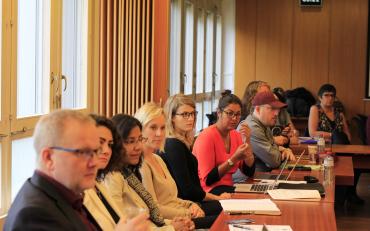
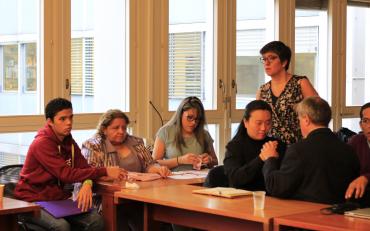
The multiple barriers that they faced such as lack of access to support services, accessible information and assistive devices makes it very difficult to even structure themselves in strong advocacy group to voice their issues. They are often marginalised even within the disability movement and can’t do not get a chance to engage in political participation and public life to claim their rights.
Experiences of World Federation of the DeafBlind (WFDB) and the International Disability Alliance (IDA) over the 10 years of work on the implementation and monitoring of the Convention on the Rights of Persons with Disabilities have shown that there is very little attention paid by national and International stakeholders on the issues of persons with deafblindness. This is both the results and the cause of the general lack of knowledge of the diversity of issues and specific inclusion requirements of persons acquired or congenital deafblindness.
WFDB as well as its members such as the African deaf blind union have succeeded progressively to engage with the broader disability movement to amplify their message within IDA as well as the European Disability Forum, or more recently African Disability Forum or indeed Sense international within the IDDC.
Few elements show that even among the disability specific work persons with deafblindness are marginalised. There are only 7 reference to persons with deafblindness in the 2011 world report on disability, 10 times more references to persons who are deaf or persons who are blind. There have been only 6 specific references to persons with deafblindness in the CRPD concluding observation of 40 countries review up to December 2016 (20 times less than for deaf persons or blind persons).
To raise the profile of issues of persons with deafblindness, there is a critical need of an evidence based global report on situation and rights of persons with deafblindeness that would become both a reference for CRPD and SDGs implementation. Such report would also be WFDB contribution to the 2020 SDGs baseline. It is planned to produce a follow up report in 2025 to measure progress.
Such reference global report is critical to build common ground and understanding across regional and global disability, development and human rights stakeholders. WFBD will use to process of development of the report to mobilise both WFDN members, their allies as well as the UN agencies. The process will be fully consultative, including via a survey, to ensure strong ownership by WFDB members.
The report will be built on evidence gathered by researchers of the International Center for Evidence in Disability London School of Hygiene and Tropical Medicine (ICED-LSHTM). While the focus of data collection by WFDB and partners will be on lower income countries, the European conference of Deafblind international in September 2017 will provide a great overview of situation in higher income countries.
As a key milestone in the development of the global report, an expert meeting will also be organized in September in Geneva both to mobilize and to gather contribution of different NGOs and UN agencies including WHO, OHCHR, ILO and the Special Rapporteur on the rights of persons with disabilities among others.
